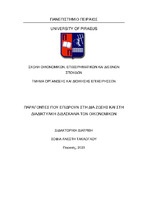Παράγοντες που επιδρούν στη δια ζώσης και στη διαδικτυακή διδασκαλία των οικονομικών

View/
Keywords
Διδασκαλία των οικονομικών ; Ενεργητικές τεχνικές ; Κοινωνικο-δημογραφικά χαρακτηριστικά ; Διαδικτυακή διδασκαλία ; Μαθησιακά αποτελέσματα ; Teaching economics ; Active techniques ; Socio-demographic characteristics ; Online teaching ; Learning outcomesAbstract
The purpose of this doctoral thesis is to investigate the extent to which it is possible, to intersperse the traditional lecture technique when teaching economics. Recent studies have highlighted the importance of a variety of active techniques, in order to improve learning outcomes. In addition, it is important to incorporate the role played by socio-demographic factors in the understanding and knowledge of economic concepts, taking into account that the last two decades in Greece were characterized by a deep and prolonged recession as well as a pandemic.
In conclusion, taking advantage of the opportunity created by the unprecedented circumstances of the COVID-19 pandemic where the process of teaching was transferred exclusively to an online environment, the effect of this context will be studied.
With the aim of finding answers to these concerns, a research began in the context of the Microeconomics course, taught in the 1st semester, which concerns the co-teaching of the students of the Department of Business Management and the Department of Tourism Studies of the University of Piraeus. A teaching model was designed that combined the traditional lecture with a variety of active techniques (discussions, use of newspaper articles, cartoons, poetry, videos, worksheets, tutorials, individual and group work, assessment quizzes). The year 2018-2019 saw the implementation of the model in its full form with all the active techniques applied. In 2019-2020 the lectures were accompanied by less active techniques. Finally, in 2020-2021 under the burden of the ban on the ban of the face to face operation of University departments that had more than 50 people enrolled, the enriched lectures were implemented in an electronic, online environment through synchronous and asynchronous teaching. The understanding and knowledge of economic concepts was measured with the widely used Test of Understanding of College Economics (TUCE-4), which students completed at the beginning and end of each year.
Based on the findings of the statistical analysis on the data collected in the three years, there is no demographic factor consistently associated with learning outcomes, while taking a high school economics course improves understanding of economic concepts. Learning outcomes were improved in all three academic years. The model applied in 2018-2019 with the abundance of active techniques showed statistically significant improvement in TUCE-4 compared to the one with fewer techniques used in 2019-2020. A major finding is that online courses not only did not lack in effectiveness compared to the in-person 2018-2019 model, but significantly improved results compared to 2019-2020.


